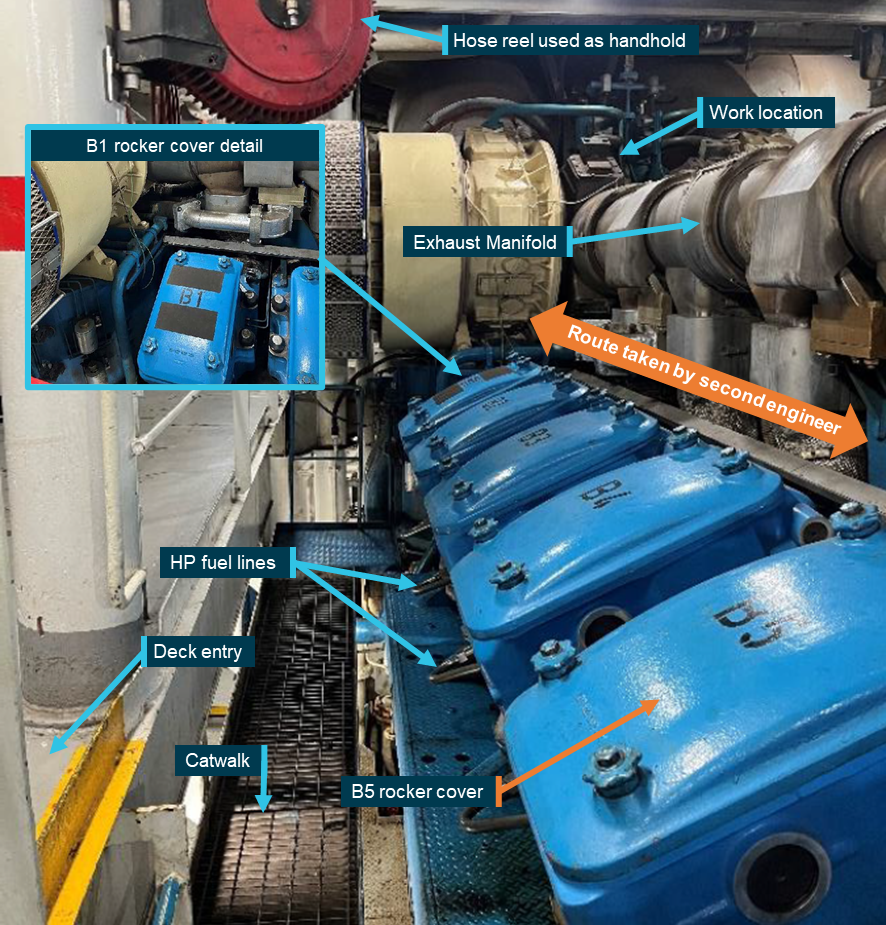
Safety management system procedures were not effectively implemented when the Spirit of Tasmania I’s second engineer was seriously injured in a fall during engine maintenance earlier this year, the final report from an ATSB investigation details.
The accident occurred during a routine oil change on one of the ship’s main engine turbochargers, while it was berthed in Geelong, Victoria, on 6 March 2025.
Problems encountered during the work led to the decision to replace the turbocharger’s bearing housing cover plate. This required climbing on and off the engine several times.
While climbing off the engine during the work, the second engineer fell heavily and sustained a serious knee injury, which later required surgery.
The ATSB’s investigation found a standard safe route to access the top of the main engine was not defined or used, despite access being a regular requirement.
“After working on top of the main engine, the second engineer walked along its rocker covers before stepping across to the opening in the railing, slipping off the cover and falling,” ATSB Director of Transport Safety Stuart Macleod said.
Mr Macleod also noted the decision to replace the bearing housing cover plate represented a significant change to the scope of the work initially planned.
“Despite this significant change in scope, the existing Job Safety Analysis was not reviewed, nor was a new prestart safety checklist completed by those conducting the work,” Mr Macleod said.
“This was due to perceived time pressure, and a perception by those involved that the work was low risk. Consequently, the risk of slips and falls involved in the work was not properly considered.”
More broadly, the ATSB’s investigation identified Spirit of Tasmania I’s safety management system procedure for Job Safety Analyses (JSAs) was not effectively implemented at the time of the occurrence.
“This meant the JSA for replacing the main engine turbocharger bearing housing cover plate was not in place, and JSAs covering other work on top of the engine did not address the risks involved in accessing the work site,” Mr Macleod said.
The ship’s manager, TT-Line, reacted proactively to the accident and put in place several engineering and procedural measures to reduce the risk of falls from the engine top and general access risks.
The ship’s manager has provided a removable work platform for safe access to the top of the engines for Spirit of Tasmania I and sister ship Spirit of Tasmania II, and the JSAs related to work on turbochargers and the exhaust manifold have been updated to include the access risk.
“The ATSB has investigated numerous occurrences involving unsafe working practices on board ships,” Mr Macleod said.
“A recurring factor in such incidents is the people involved in the work not recognising the hazards involved and/or considering the work routine and low risk.
“This investigation highlights the importance of effective risk controls, which requires staff at all levels on board and ashore to contribute towards the effective implementation of the shipboard safety management system.”
Read the final report: Serious fall injury in the engine room of Spirit of Tasmania 1, Geelong, Victoria, on 6 March 2025


